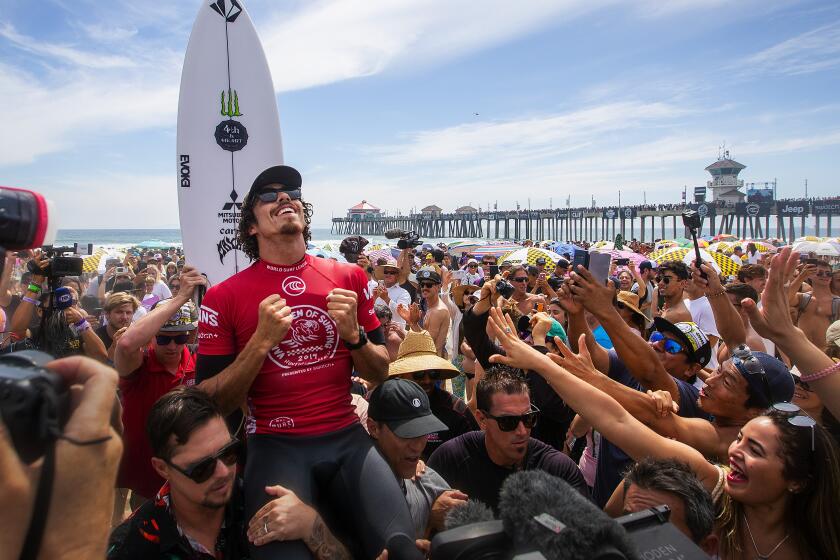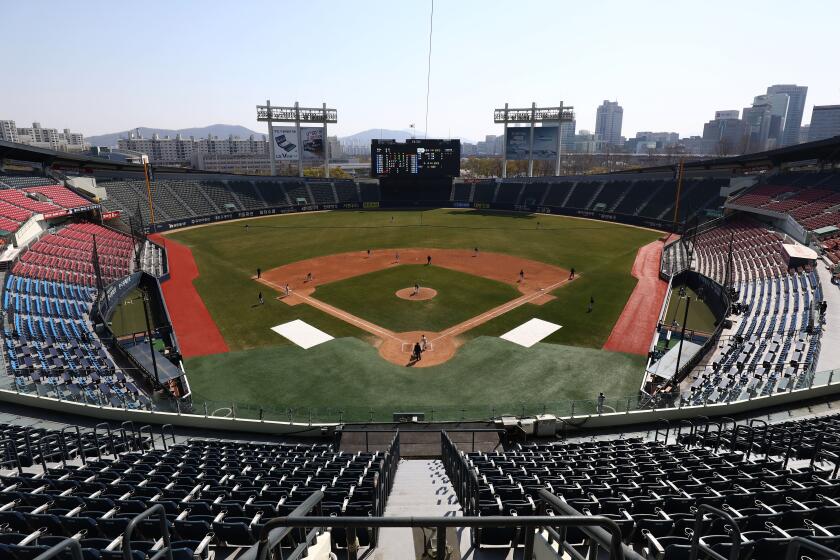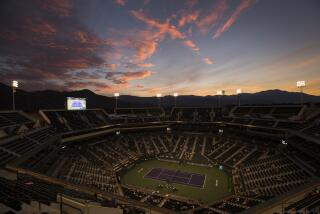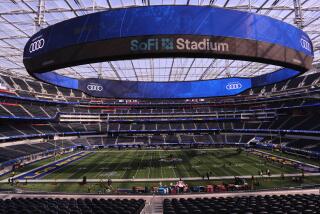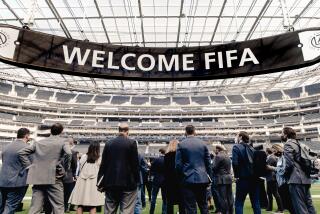Column: U.S. Open tennis tournament to be played mostly to the sound of airplanes overhead
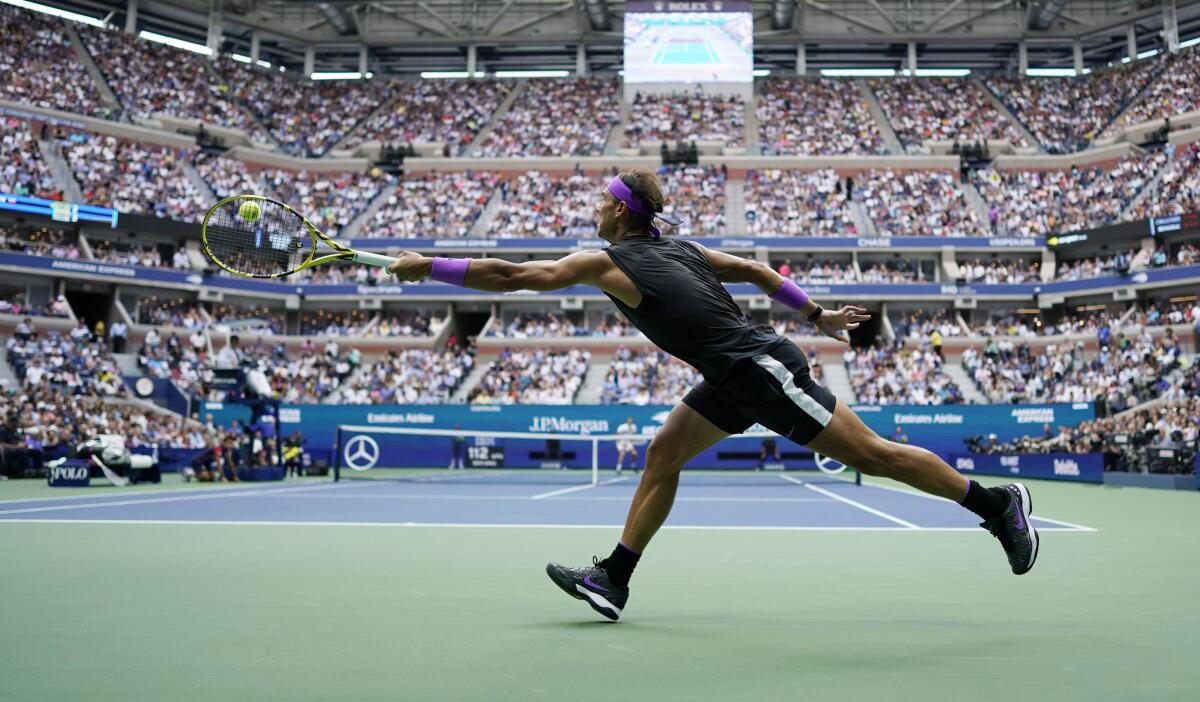
Almost as if on cue, an airplane rumbled over the Billie Jean King National Tennis Center in New York on its path to nearby LaGuardia Airport while Stacey Allaster, tournament director of the U.S. Open, announced in a virtual news conference that this year’s Open would take place with players confined in a “bubble” and without the presence of fans whose passion makes the tournament so vibrant and compelling.
Take away the qualifying rounds, part of the doubles draw, all of the mixed doubles, wheelchair and junior events, many of the linespeople and the fans who shout their support from the upper reaches of the main stadiums and smartly debate the backhands of players consigned to the outer courts, and what’s left?
Planes roaring overhead and something that will be the U.S. Open in name but not in spirit.
Barring a COVID-19 contagion, the show will go on from Aug. 31 through Sept. 13 and will be a quieter version of what’s traditionally the most raucous and rigorous Grand Slam event of the year. It will be preceded by the Western & Southern Open, which will move from Cincinnati to Flushing Meadows to become a sort of warmup tournament that will run from Aug. 19 to 28.
The U.S. Open draw will feature 120 players plus eight wild cards in each of the men’s and women’s draws. Prize money will be $60 million for the two events, with $3.3 million to be given to the women’s tour and $3.3 million to the men’s tour to compensate players who won’t have qualifying rounds to earn money and fight for a spot in the main draw.
Organizers have canceled the Vans U.S. Open of Surfing, an annual event near the Huntington Beach for 60 years, because of the COVID-19 pandemic.
“We’re in the place of reopening society,” said Dr. Brian Hainline, chief medical officer of the NCAA and an advisor to the U.S. Tennis Assn. Playing the Open, he added, “is also good for society because sport is an essential aspect of who we are as human beings. Sport does bring us health and well-being, and even to watch sport, it brings us so much pleasure.”
Joyless though it may feel with empty stands and rules that include players physical distancing and wearing masks except when in a match or training, staging the Open will generate money the USTA says it will plow back into grassroots growth efforts. USTA Chief Executive Mike Dowse said the organization expected its operating income to plunge 80% this year, so earning something through TV rights is better than earning nothing.
But is it something worth doing? The USTA insists it is.
“This is fantastic news for tennis,” Allaster said. “The U.S. Open is open for business.”
And so it will be business unusual, without fans and media but with elaborate medical protocols designed to mitigate the chances players or their entourages will contract the novel coronavirus. Those entourages will be limited to three guests per player, with negotiations ongoing to determine how many will be allowed on site. “We’ve created this centralized U.S. Open and Western & Southern Open world,” Allaster said.
Players will be urged to stay at the TWA Hotel near JFK Airport, where they’ll be tested for COVID-19 before they leave for the tennis complex and will undergo testing throughout the tournament. They’ll have meals and entertainment available at the hotel and on the tournament grounds, where suites usually filled by fans and corporate networkers will be used as player lounges. Space at the tennis center will be converted to soccer and basketball courts for the amusement of players. Presumably, they’ll maintain a responsible distance from one another.
Serena Williams, who won six of her 23 Slam singles titles at Flushing Meadows and was the runner-up each of the past two years, made a virtual appearance Wednesday to say she “cannot wait” to play again. She’s so eager, Allaster said, that Williams had a court installed at her Florida home similar to the U.S. Open’s hardcourt surface.
A look at how sports leagues, including the NFL, MLB, MLS, NBA and NHL, are responding to the coronavirus outbreak.
“I’ll certainly miss the fans. Don’t get me wrong,” Williams said. “Just being out there in that New York crowd and hearing everyone cheer. I’ll really miss that and getting me through some of those tough matches. But this is crazy. I’m excited.”
Usually the final Slam, the U.S. Open will instead be the second this year; the Australian Open was played before the coronavirus pandemic led to the cancellation of Wimbledon. The French Open, usually played in late May and early June, previously announced it would start the week after the U.S. Open. On Wednesday, it pushed the main draw back to a Sept. 27 start. Also on Wednesday, the women’s WTA tour announced it would restart Aug. 3 with an event in Palermo, Italy. The men’s ATP tour announced it would restart Aug. 14 with the Citi Open in Washington, D.C.
Many prominent players, including Novak Djokovic and Rafael Nadal, have expressed reservations about traveling to the United States and playing here under such strict health standards. Simona Halep, ranked No. 2 in the world among women, said she did not plan to play.
Allaster said tournament organizers had received assurances from the federal government that athletes would be allowed to enter the country, and she’s confident players will want to compete. “We are going to have incredible star power for the Western & Southern Open and the U.S. Open,” she said.
Or something that will resemble those tournaments. Open for business, yes, but not the Open.
More to Read
Go beyond the scoreboard
Get the latest on L.A.'s teams in the daily Sports Report newsletter.
You may occasionally receive promotional content from the Los Angeles Times.

